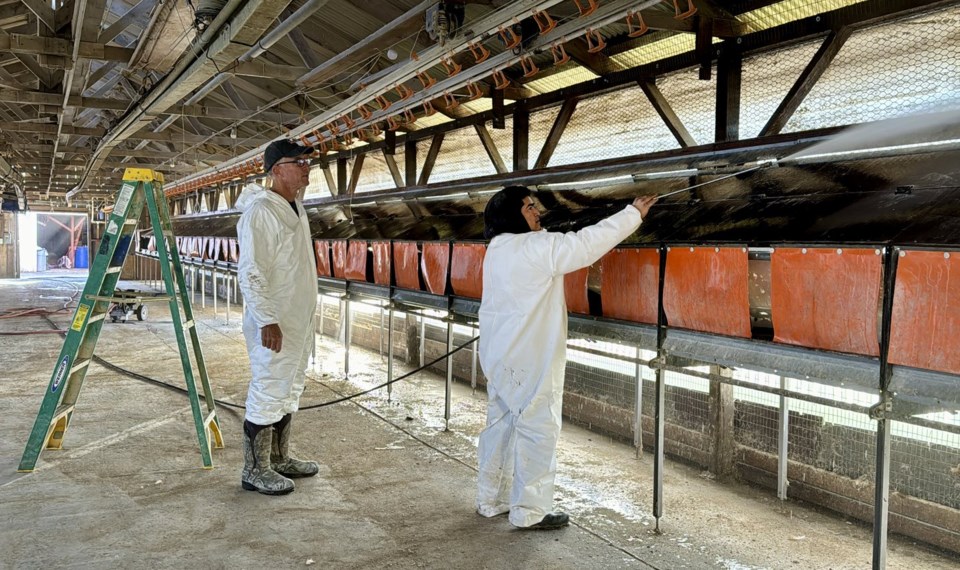TORONTO ŌĆö Health sa╣·╝╩┤½├Į has authorized three influenza vaccines that could be used if bird flu became a pandemic, the agency says.
The federal government also has an agreement with vaccine manufacturer GSK for domestic vaccine production that could be accelerated if needed, the Public Health Agency of sa╣·╝╩┤½├Į told The Canadian Press in an email.
There are no indications that H5N1 bird flu would spark a pandemic, but experts urged preparedness ŌĆö including increased flu surveillance, early detection and vaccine availability.
PHAC confirmed Wednesday that a sa╣·╝╩┤½├Į teen hospitalized last week is the first person to acquire H5N1 flu in sa╣·╝╩┤½├Į. It wasn't known how they were exposed, but the strain is related to viruses found in flocks in an outbreak at sa╣·╝╩┤½├Į poultry farms. The teen was critically ill in hospital as of Tuesday.
Human-to-human transmission of H5N1 ŌĆö a strain of highly pathogenic avian influenza ŌĆö is rare with no evidence of sustained transmission, experts say. The majority of human cases in the United States and around the world have been due to contact with infected birds, farm animals or wildlife.
But the more people become infected by animals, the more opportunities the virus has to mutate and spread between humans, said Angela Rasmussen, a virologist at the University of Saskatchewan's Vaccine and Infectious Disease Organization (VIDO).
"The longer a virus is able to get evolutionary experience with a particular host species, it's going to continue to adapt to being in that host," Rasmussen said.
"One of those adaptations would potentially be increased transmission and increased transmission efficiency."
Rasmussen said the Canadian government should build a stockpile of H5N1 influenza vaccines like the United States rather than rely on agreements with manufacturers to supply them on demand.
Dr. Fahad Razak, an internal medicine specialist at St. Michael's Hospital in Toronto, agreed, noting it would take three to six months to deploy an H5N1 vaccine under existing contracts.
"In the event that you've had to rapidly start to protect people, the ramp-up period could just be too slow," said Razak, who was scientific director of a provincial advisory table during the COVID-19 pandemic.
The Public Health Agency of sa╣·╝╩┤½├Į said by email that it is not stockpiling H5N1 vaccines because "the shelf-life of the vaccines is only up to 2 years."
Razak countered that sa╣·╝╩┤½├Į doesn't need vaccine doses for the whole country.
Keeping enough H5N1 vaccines on hand to immunize people at high risk because they come in contact with potentially infected birds and animals, such as agricultural workers, could be "a middle of the road approach," he said.
Finland is already offering H5N1 vaccination "to individuals who have a high occupational risk of being exposed to avian flu," said Dr. Matthew Miller, the director of the Michael G. DeGroote Institute for Infectious Disease Research at McMaster University in Hamilton.
Miller said offering the shot to dairy workers, poultry workers or those who work with potentially infected wildlife to reduce their risk of exposure would also reduce the risk of a pandemic.
ŌĆØThis is something that's being talked about in jurisdictions all over the world," said Miller.
When it comes to surveillance, PHAC said provincial and territorial public health agencies must report both "confirmed and probable" H5N1 cases within 24 hours. It said the National Microbiology Lab in Winnipeg can rapidly test and detect human cases for jurisdictions unable to test locally
The Canadian Food Inspection Agency has also been testing milk for signs of H5N1 in dairy cows. There has not yet been any indication of the virus in Canadian cows, but bird flu has plagued many herds in the United States.
Razak also called for wastewater testing ŌĆöused during the COVID-19 pandemic ŌĆö to scale back up for bird flu.
British Columbia is actively looking for H5N1 in its wastewater, but Ontario halted its provincial wastewater testing program earlier this year.
PHAC does wastewater testing for seasonal flu in several cities and towns across the country, including Toronto. But it doesn't check specifically for H5N1 bird flu because it's "not possible to differentiate positive wastewater signals that are due to wildlife versus human or livestock sources," the agency told The Canadian Press in an email.
That makes "it challenging to accurately interpret results to inform risk assessment and potential actions," it said.
Still, wastewater testing can be set up in targeted locations where the majority of waste comes from humans, Razak said.
Shayan Sharif, a pathobiology professor at the Ontario Veterinary College at the University of Guelph, said wastewater testing is useful as an "early warning process" whether it detects animal or human virus.
"At least have it as some sort of a screening system put in place in order to identify it as it happens in real time,ŌĆØ Sharif said, noting that once H5N1 is detected, health officials can investigate to determine where it's coming from.
This report by The Canadian Press was first published Nov. 13, 2024.
Canadian Press health coverage receives support through a partnership with the Canadian Medical Association. CP is solely responsible for this content.
Nicole Ireland, The Canadian Press



